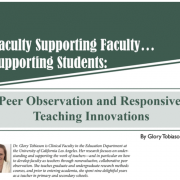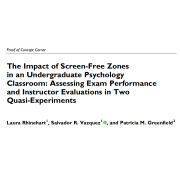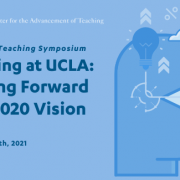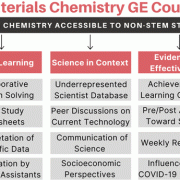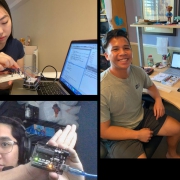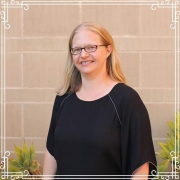Two Publications Document How UCLA’s PAROSL Program Supports Inclusive, Student-Centered Pedagogy
/in Pedagogy /by michelle chenPeer-Assisted Reflections On Student Learning or PAROSL is a UCLA program in which pairs of faculty observe each other’s classes, discuss student learning, and implement an innovative teaching technique. PAROSL supports faculty as they find ways to make their teaching more inclusive and student-centered. Two new studies published in the International Journal for Academic Development and Change: The Magazine of Higher Learning provide evidence of the positive impact that PAROSL can have on faculty thinking and pedagogy.
The author, Dr. Glory Tobiason (Clinical Faculty in Education at UCLA and a researcher at CRESST) developed and began studying the program in 2019, in collaboration with CAT, CEILS, and EPIC. By observing four cohorts of faculty (n=40) as they engaged in PAROSL, she found that the program helped instructors shift from a content-centered logic to a student-centered one (DOI: 10.1080/1360144X.2021.2015691). She also identified key design features of peer observation that support responsive teaching innovation (DOI: https://doi.org/10.1080/00091383.2021.1987791).
The research comes at an opportune time, when universities across the country (including UCLA) are working to reform the way teaching is supported and evaluated. For institutions aiming to include peer observation in these reforms, programs like PAROSL suggest a promising way to strengthen inclusive, student-centered pedagogy. Details and abstracts for the articles are included below.
Citation:
Tobiason, G. A. (2021). Faculty supporting faculty… supporting students: Peer observation and responsive teaching innovations. Change: The Magazine of Higher Learning, 53(6). https://doi.org/10.1080/00091383.2021.1987791
Abstract:
Research-based instructional practices make a difference for students, but simply telling faculty to adopt them does not foster lasting changes in teaching practice. More promising is faculty development that’s embedded in the day-to-day work of teaching. In the Peer-Assisted Reflections On Student Learning program at the University of California Los Angeles, pairs of faculty members observe each other’s classes, reflect on how student learning is unfolding, and collaboratively devise teaching innovations that respond to the actual needs of students. This model can be effective when it provides adequate time for reflection; is framed around student learning, not teaching; is explicitly nonevaluative; and provides coordinating guidance for faculty pairs.
Citation:
Tobiason, G. A. (2021). From content-centered logic to student-centered logic: Can peer observation shift how faculty think about their teaching? International Journal for Academic Development. Advance online publication. https://doi.org/10.1080/1360144X.2021.2015691
Abstract:
This research investigates how peer observation programs can be designed to enhance faculty use of student-centered logic. Data include participants’ self-reports (interviews) and 50 hours of recorded faculty-faculty dialogue. Findings suggest specific design features that may increase fluency in student-centered logic. The study may be useful to academic developers interested in helping faculty move beyond content-centered, lecture-based approaches to teaching.
Summary of “The impact of screen-free zones in an undergraduate psychology classroom: Assessing exam performance and instructor evaluations in two quasi-experiments”
/in Pedagogy /by michelle chenSummary of Rhinehart, L., Vazquez, S. R., & Greenfield, P.M. (2021). The impact of screen-free zones in an undergraduate psychology classroom: Assessing exam performance and instructor evaluations in two quasi-experiments. Teaching of Psychology, https://doi.org/10.1177/00986283211017443
Many undergraduates look at screens during lectures. The instructor in Psychology 133G, Prof. Patricia Greenfield, and two long-term TAs, Dr. Laura Rhinehart and Salvador Vazquez, became concerned about the distraction produced by screens in class and decided to address the issue through both research and practice. Two quasi-experimental studies in Psychology 133G, Culture and Human Development, explored results of restricting screens to one area of the classroom on exam performance and instructor evaluations. Their results have been recently published in Teaching of Psychology, a journal of the American Psychological Association. (https://journals.sagepub.com/doi/full/10.1177/00986283211017443)
In both studies, these policies improved exam scores in the class. Students who chose to sit in the screen-free zone did better on exams. Horizontal division of the classroom where students could use their laptops only if they sat in the back few rows of the classroom produced student pushback in the form of qualitative comments on their evaluation forms and lower evaluations in quantitative instructor ratings. In contrast, vertical division of the classroom where one side was for screens and the other side was a no-screen section was accepted without comment by students. Together, these studies show that students who sit in screen-free sections tend to do better on assessments. Additionally, students accept vertical division of a classroom into screen and screen-free zones. Now that we are returning to classroom teaching, these studies can be useful for students and instructors alike; they imply that students will do better if they attend at least some lectures in a screen-free section. While screens are of course central to remote learning, the findings also imply that students should listen and view remote lectures with notifications turned off and without multitasking online, like checking email or social media.
Lessons Learned: UCLA Symposium on Remote Teaching during COVID-19
/in Pedagogy /by michelle chenThe 3rd annual UCLA Teaching Symposium took place from April 12-16, 2021, and focused on the theme “what we learned from remote teaching that we can apply to the future when we are back in person.” Sessions were hosted by the Center for the Advancement of Teaching (CAT) as well as our campus partners, the Center for Education Innovation and Learning in the Sciences (CEILS), Excellence in Pedagogy and Innovative Classrooms (EPIC), and Online Teaching & Learning (OTL). Read more about the symposium in the UCLA College article.
Teaching Scientific Literacy and Critical Thinking in a Chemistry GE Course
/in Pedagogy /by Anita HanA recent article by Roshini Ramachandran, CAT’s Assistant Director of Curricular Initiatives, discusses the pedagogical strategies and assessment results from her CHEM 3: Material World general education course.
Taught remotely in Fall 2020, the course activities focused on problem-based learning utilizing case studies to make chemistry relevant to current real-world situations. Furthermore, social justice themes (e.g., underrepresentation in science, war on drugs, nuclear proliferation, climate change, etc.) were weaved through several topics. The various course components were assessed using survey instruments, and student feedback demonstrated that this multifaceted approach enabled them to engage, evaluate, and communicate science with one another.
Roshini Ramachandran is the Assistant Director of Curricular Initiatives at UCLA’s Center for the Advancement of Teaching. She leads the assessment of UCLA’s General Education Foundation of Scientific Inquiry (GE FSI) curriculum and conducts education research to enhance teaching and learning in STEM courses. She also teaches undergraduate chemistry courses and enjoys mentoring undergraduate students on independent research projects. This teaching-as-research project was done in collaboration with Alex Spokoyny (Chemistry department).
Read the article in the Journal of Chemical Education.
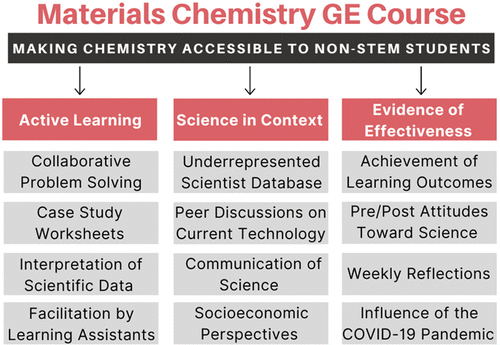
CAT Grant Contributes to Remote Learning Success for Physics Labs
/in Grants, Pedagogy /by michelle chenIn Spring 2019, CAT awarded an Instructional Improvement Major Grant to Professor Katsushi Arisaka, Professor Jay Hauser, and Dr. George Trammell in Physics & Astronomy for a proposal titled “New Development of Hands-on Physics Laboratory for Scientists and Engineers: Revising Physics 4AL and 4BL.”
The proposal was for revisions to the current Physics 4AL and 4BL courses. These courses are amongst the largest lab-based undergraduate education programs at UCLA, offered by the Department of Physics and Astronomy. Through upgrades to Physics 4AL and 4BL, students will be better equipped to:
- Problem solve and build solutions as the next generation of scientists and engineers.
- Understand and apply fundamental principles of physics in the context of rapid technological advancements in daily life.
- Demonstrate mastery of the latest computer hardware and software tools.
The following three specific concepts are emphasized:
- Designing new labs with clear scientific aims, based on well-defined top-down hypotheses.
- Taking full advantage of the latest data collection technology, such as Arduino and Raspberry Pi.
- Data gathering and analysis using modern and mainstream computer programming, such as Python-based JupyterLab.
With the COVID-19 situation and move to remote instruction, the professors and TAs were able to utilize these revised concepts and tools to quickly convert their labs to a remote format.
Read about the Remote Instruction Experience from the lab instructors, TAs, students
Student Perspectives on Remote Learning in a Large Organic Chemistry Lecture Course
/in Pedagogy /by michelle chenA recent article by Roshini Ramachandran, CAT’s Assistant Director of Curricular Initiatives, and a colleague in the Chemistry department focuses on student perspectives and instructor insights on remote teaching/learning in CHEM 14C.
The study details the efforts taken in remotely teaching a large organic chemistry lecture course in the midst of the recent COVID-19 pandemic. It highlights the instructor’s best practices combined with student perspectives to tackle the various challenges associated with remote learning. The authors hope that this work can assist faculty in remotely teaching their future courses, and contribute to the information being collected globally regarding remote learning in this new situation.
Roshini Ramachandran is the Assistant Director of Curricular Initiatives at UCLA’s Center for the Advancement of Teaching. She leads the assessment of UCLA’s General Education Foundation of Scientific Inquiry (GE FSI) curriculum and conducts education research to enhance teaching and learning in STEM. She also teaches undergraduate chemistry courses and enjoys mentoring undergraduate students on independent research projects.
Welcome New Staff at CAT: Elizabeth Goodhue
/in Pedagogy, Staff Highlights /by michelle chen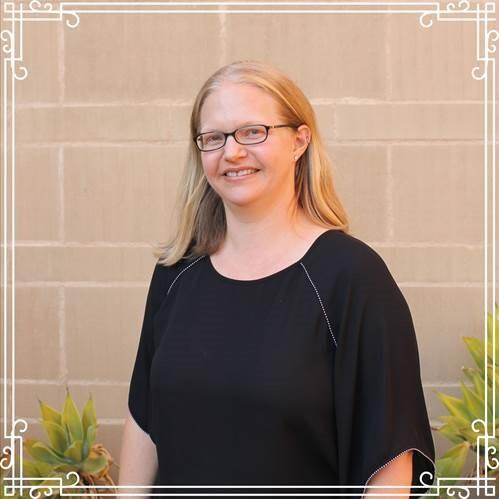
The Center for the Advancement of Teaching recently hired Elizabeth Goodhue as the new Associate Director of Faculty Engagement.
Position: Associate Director of Faculty Engagement
Prior to working for CAT: She worked for eight years in the Center for Community Learning helping faculty and graduate students develop community-engaged courses and directing the center’s academic internship program.
Education: Elizabeth got her Ph.D. in English here at UCLA, after studying at the University of Arizona for her Undergraduate education. She is originally from Tucson, AZ.
Best Part of New Job: Continuing to work with faculty and graduate students while helping CAT to imagine and realize our role campus wide. There are many contexts where this may be addressed but Beth is especially excited about developing and supporting faculty-led learning communities and opportunities to support scholarship on teaching and learning. This fall, she has been working with CAT’s Learning Spaces, Design and Maintenance (LSDM) team to gather feedback on how instructors are utilizing the flexible learning spaces they have designed. The plan is to host lunches in the new year to learn from these instructors about what features they still need help using and to support both current and prospective users who want to integrate more active learning into their courses.
Most Challenging Aspect of New Position: “Balancing the diverse needs of our campus-wide initiatives as well as the focused partnerships CAT is developing.”
Passions and Hobbies: Elizabeth is a new mom to her 7-month-old son, Alejandro! She also enjoys yoga, and walks and hikes with her dog Shelly, as well as cooking and baking delicious things.
Proudest Accomplishments: Elizabeth is immensely proud of launching a 495 course on community engaged pedagogy four years ago, which was the first pedagogy course in UCLA’s new Graduate Student Professional Development subject area. She is also very proud of her publishing about pedagogy, as well as being a new mom, and being able to simultaneously transition into both of these new and important roles at home at CAT.
Second Annual New Faculty Teaching Engagement
/in Pedagogy /by michelle chenThe Center for the Advancement of Teaching hosted UCLA’s second annual New Faculty Teaching Engagement on September 20, 2019 to welcome all faculty and lecturers new to UCLA. This year’s event included a special session on creating inclusive classrooms, as well as three short faculty talks by Joshua Samani (Physics and Astronomy), Todd Presner (Germanic Languages, Comparative Literature, and Jewish Studies), and Genevieve Carpio (Chicana/o Studies). The day concluded with roundtable sessions featuring campus partners who lead initiatives that support teaching and learning.
We thank our partners for helping to make this year’s event such a great success. Based on data from our exit survey, 37.5% of respondents agree and 62.5% strongly agree that “In the future, faculty from my division or school should be encouraged to attend the New Faculty Teaching Engagement event.”
New Community-Engaged Pedagogy Faculty Workshops
/in Pedagogy /by michelle chenThe Center for the Advancement of Teaching is excited to announce a new collaboration with the Center for Community Learning: Community-Engaged Pedagogy Faculty Workshops.
Join us for a lunchtime discussion with colleagues engaged in various forms of community-engaged teaching and research. Our first event will be on October 23rd from 12-1:30 in Powell 186.
MULTIPLE MODELS FOR COMMUNITY-ENGAGED TEACHING
Community-engaged pedagogy is an approach that seeks to create reciprocal value for the learner and the community. Faculty in many disciplines have embraced this pedagogy in creative ways in a wide range of courses.
In this session, you’ll hear from colleagues to illustrate various models for this community-engaged teaching and learning: client/consulting, co-learning, research, and direct service approaches. You’ll also learn about the new draft framework for community-engaged teaching under review by the Undergraduate Council.
PANELISTS:
Andy Atkeson, Economics
Jenny Jay, Civil and Environmental Engineering
Lauri Mattenson, Writing Program
Carla Suhr, Spanish and Portuguese
MODERATOR:
Shalom Staub, Center for Community Learning
Interesting links
Here are some interesting links for you! Enjoy your stay :)Pages
- 2012 Andrea L. Rich Night to Honor Teaching
- 2013 Andrea L. Rich Night to Honor Teaching
- 2014 Andrea L. Rich Night to Honor Teaching
- 2015 Andrea L. Rich Night to Honor Teaching
- 2016 Andrea L. Rich Night to Honor Teaching
- 2017 Andrea L. Rich Night to Honor Teaching
- 2018 Andrea L. Rich Night to Honor Teaching
- 2019 Andrea L. Rich Night to Honor Teaching
- 2020 Andrea L. Rich Night to Honor Teaching
- 2020 Fall Teaching Forum
- 2021 Andrea L. Rich Night to Honor Teaching
- 2021 Faculty Summer Institute for Course (Re)Design
- 2021 New Faculty Teaching Engagement
- 2022 Andrea L. Rich Night to Honor Teaching
- 2022 New Faculty Teaching Engagement
- A TA’s Guide to Remote Teaching
- About TLC
- Access to the Collection
- Additional Services
- Assessment Support
- Audio Visual Equipment & Rates
- Audio Visual Equipment Reservations
- Audio Visual Services
- AVS Policies
- Bruin Bound
- BruinCast (Lecture Capture)
- Campus-wide TA Training Requirements
- CAT Graduate Student Educational Development Fellows
- Categories
- Center for Educational Assessment
- Classroom Live-Streaming, Web-Conferencing, and Recording
- Classroom Network
- Classroom Orientation
- Classroom Search
- Collegium of University Teaching Fellows
- Common Collaborative Learning Environment (CCLE)
- Community Based Learning
- Community Instructional Transformation Initiative
- Consultations
- Contact Us
- Course Design
- Departmental Contacts for TA Training
- Departments with Foundations Series Exemptions
- Digital Content FAQ
- Distinguished Teaching Awards
- Equitable & Inclusive Teaching
- Evaluation Coordinator Directory
- Evaluation Coordinator Information
- Evaluation of Instruction Program
- Events
- Exception List – Courses Excluded from Evaluation
- Faculty Advisory Committee
- Faculty Programs
- Faculty Summer Institute for Course (Re)Design
- FAQs
- Fostering Student Engagement Remotely
- Frequently Asked Questions
- GE Foundations of Scientific Inquiry
- General and Organic Chemistry Course Videos
- Graduate Student Programs & Support
- Grant Programs
- Grant Writing and Reporting
- Guidance for the Use of Generative AI
- Guidelines for Preparing A Seminar
- High-Impact and Student-Centered Learning
- Holistic Evaluation of Teaching at UCLA
- Home
- IIP Grant Showcase
- Information for Faculty
- Information for Students
- Instructional Improvement
- Instructional Improvement Grants
- Instructional Media Collections & Services (Video Reserves)
- Instructional Media Production (Video Production Services)
- Instructional Media Production Archives
- Instructional Resources for TAs
- Instructions on Using Evaluation CSV Data Files
- Instructor Access to Online Evaluations Reports
- Instructor Evaluations FAQ
- Interpretation of Test Scoring Statistics
- Keep Teaching – Pedagogy
- Lab Materials
- Leadership
- Learn @ Lunch Series
- Learning Spaces
- Locations
- Media Lab Equipment
- Media Lab Frequently Asked Questions
- Media Viewing Lab
- Mini-Grant Program
- My Bookings
- New Faculty Teaching Engagement
- News
- Night to Honor Teaching
- Online Course Development Interviews
- Online Evaluation Email Notifications
- Online Evaluation Form Views
- Online Evaluation Instructions
- Online Evaluation Schedule
- Partnerships
- Peer Assisted Reflections on Student Learning
- Placing Reserves
- Program Review
- Programs and Services
- Publications
- Recordings from previous TA Conferences
- Requesting Online Access to Materials
- Research and Publications
- Resources for Sustaining Instructional Continuity
- Room Reservations
- Sample Page
- Schedule: Teaching at UCLA: Looking Forward with 2020 Vision
- Senior Survey
- Staff Directory
- Student Access to Online Evaluations
- Student Experiences of Teaching Revision Project
- Student Resources for Remote Learning
- Students Evaluations FAQ
- Support and Resources for Your Students
- Support Resources for Your Students
- Symposium – Teaching at UCLA: Looking Forward with 2020 Vision
- TA Handbook
- TA Training Workshops & Events
- TA Workshops
- TAC Program Roles and Responsibilities
- Tags
- Teaching & Learning Professional Development Opportunities for UCLA Graduate Students
- Teaching Resources
- Teaching Showcase
- test
- Test Scoring Service
- UCLA Classroom Information
- UCLA Teaching Policies
- University Policies Guiding TAs
- Using TSS Data Files for Gradebook Uploads
- Who We Are
- Workshop Recordings and Resources


